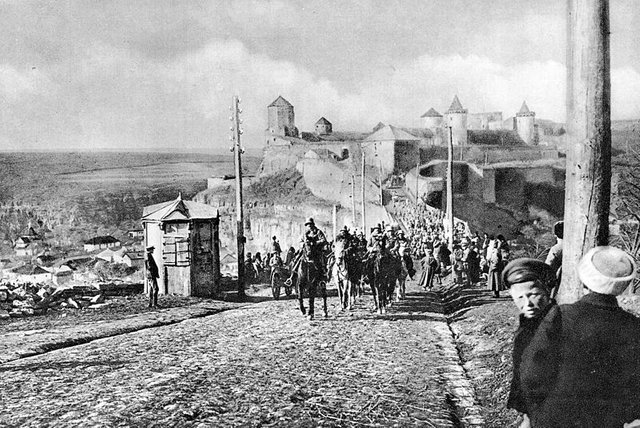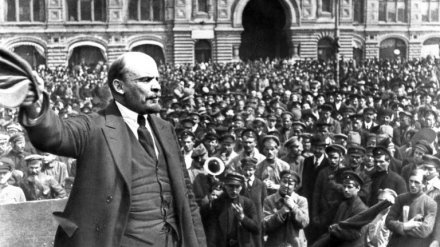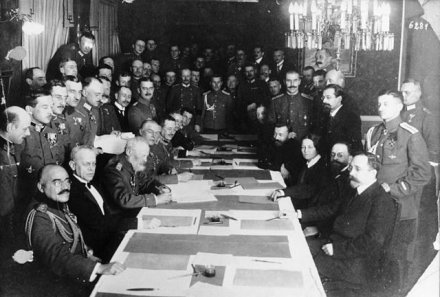11-day war: The war that Soviet Russia lost to Germany
One of the most notable events of the twentieth century was Germany's tragic defeat to the Soviet Union in World War II. In 1941, Hitler's massive invasion of the Soviet Union by 4 million troops led to Operation Barbarossa, a deadly battle of the Soviets on the outskirts of Moscow, the brutal siege of Leningrad, the historic Battle of Stalingrad,The largest tank battle in Kursk history, the Soviet occupation of Berlin by the Germans in 1945, overcoming the fierce resistance of the Germans, and Hitler's suicide - these events have faded into the history of the twentieth century. But it was the Soviets' second war with the Germans. Compared to that, the first German-Soviet war is almost forgotten in history. This war took place in 1918.
From the early stages of World War I, the Russian Empire was at war with the Central Powers (Germany, Austria-Hungary, Bulgaria and the Ottoman Empire). The Russian invasion of East Prussia in Germany in 1914 failed miserably, but the Russian invasion of the Austrian-Hungarian Galicia succeeded. In the face of intense German and Austro-Hungarian invasions in 1915, Russian troops were forced to retreat, and the central power, Russia, occupied Poland;But in the Caucasus the Russians were able to repel the Ottoman invasion. The Austro-Hungarian military was almost destroyed during the Russians' 'Brusselv attack' in 1917, and German intervention saved them from certain defeat; In the Caucasus, Russian troops advanced into the lands of the Ottoman Empire; But they failed to expel the Germans from Russian soil.

Source
Corruption and inefficiency in the conduct of the war by the Russian government, the death of millions of soldiers as a result of the war, and the food crisis and other sufferings of the Russian people as a result of the war have made the Russian people increasingly anti-war. The March 1917 revolution in the Russian capital, Petrograd, ended the monarchy in Russia and brought a provisional government to power. This government decided to continue the war against the central power,But in July 1918, the Russians were defeated and the Germans occupied Lithuania and West Latvia. Under these circumstances, the Bolsheviks, led by Vladimir Lenin, seized power by overthrowing the Provisional Government on November 8, 1917, exploiting the anti-war attitude of the Russian military and the people.
On November 8, the Bolsheviks issued a "peace decree" calling on all parties to the First World War to establish peace without occupying land or paying compensation. At the same time, they announced the withdrawal of Russia from World War I. The reasons for their decision were multiple The Bolsheviks regarded World War I as an 'imperialist war' and had no interest in participating in it;The Bolsheviks came to power by exploiting the anti-war attitude of the Russian troops and now it was politically impossible for them to send those troops back to the battlefield; It was impossible for them to survive against the central power even if the war continued; And it was more important for them to end the war against the central powers and establish their own rule inside Russia.

Source
On December 3, 1918, a Bolshevik delegation arrived in Brest-Litovsky, a devastated German-occupied Russian city of Poland, for talks, and a ceasefire between the two sides took effect on December 15. Peace talks between the two sides began on December 22, and the Bolsheviks realized that peace was not as easy as declaring peace. Because the Germans demanded a high price for peace.Note that among the member states of the Central Powers, Germany was the main member, the others were only Germany's 'junior partners'.
The Germans demanded Russian Poland, Lithuania, and western Latvia from the Bolsheviks as conditions for peace. The Germans occupied these territories between 1914 and 1917, and they were in full control of the peace talks.
The conditions proposed by the Germans were strict for the Bolsheviks, but given the military dominance of the Germans and the military weakness of the Bolsheviks, Lenin pressured other Bolshevik leaders to accept these conditions. But the majority of the Bolsheviks were against accepting such conditions, and in January 1918 the Central Committee of the Bolshevik Party rejected the agreement.
In fact, the Bolshevik government was not a normal government. Normally any government in such a situation would try to reach a flexible peace agreement as far as possible through diplomatic talks. But most of the Bolsheviks were fanatical ideologues, and they had no interest in handing over any land or people to the 'imperialists'.They believed that there was a possibility of a people's revolution in most European countries, including Germany, and that the Bolsheviks' contempt for the imperialists would encourage the people of these countries to revolt against their respective governments. The Bolsheviks therefore adopted the policy of 'neither war nor peace' towards the central power.
The implication of this policy was that the Bolsheviks would no longer fight the central powers, but would not make peace with them on the terms they were given.Soviet Foreign Minister Leon Trotsky was a staunch supporter of this policy, and he traveled to Brest-Litovsk on 10 February 1917 for talks with the Central Powers. There he announced that Soviet Russia was withdrawing from World War I without any agreement.The representatives of the Central Powers were shocked by his unprecedented announcement, as no such incident had ever taken place in the history of diplomacy. Major General Max von Hoffmann, a representative of the German Armed Forces High Command, said, 'Unerhort!' (Never heard of it!)
